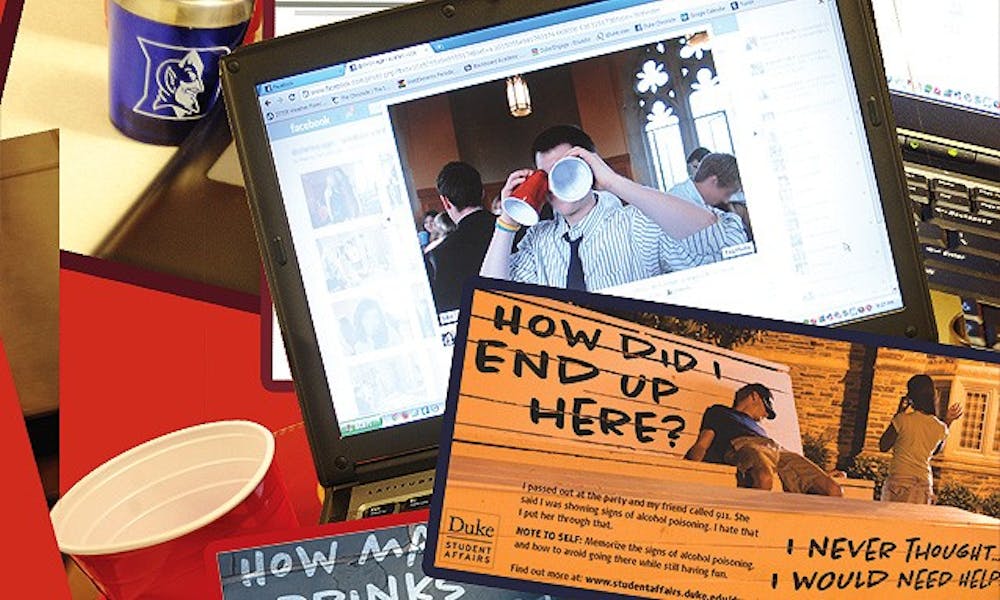References to dangerous alcohol use on college students’ Facebook pages could indicate a higher risk for drinking problems.
A recent study conducted by Dr. Megan Moreno, a pediatric and adolescent medicine doctor with the University of Wisconsin at Madison, found that college students who had photos or posts on their Facebook pages about getting drunk or blacking out were more likely to be at risk for drinking problems than their classmates.
Tom Szigethy, associate dean and director of the Duke Student Wellness Center, said he is not surprised by these findings. The results align themselves with the traditional concept of comparison drinking.
“If you isolate high-risk drinkers into one location,” Szigethy said. “It will increase the amount of drinking. College students think that high-risk behavior is the norm and therefore try to outdo those norms.”
Moreno and a team of researchers from the University of Wisconsin at Madison and the University of Washington surveyed the Facebook pages of 244 random undergraduate students with publicly available profiles, paying close attention to their photos and wall posts. One-third of the students had references to alcohol ranging from non-problematic social drinking to more risky behavior, including riding in a car while drunk or getting in trouble for alcohol-related reasons. The rest of the students had no mention of alcohol on their pages.
These 244 undergraduates were then administered a 10-question screening test that determined whether students were at risk for problem drinking. The test assessed the frequency of drinking, binge drinking and negative consequences stemming from alcohol use.
The results, published in the Archives of Pediatrics and Adolescent Medicine, showed that about 60 percent of the students who had reference to dangerous drinking on their Facebook pages were at risk for alcohol dependence and drinking related problems. One-fifth of these students said that they also had an alcohol-related injury during the previous year.
Thirty-eight percent of the students with references to non-dangerous alcohol use on their Facebook pages were at risk for alcohol dependence and only 23 percent of the students with no mention of alcohol on their pages were found to be at risk, according to the study.
In terms of incorporating the findings of the study into alcohol-dependence prevention at Duke, Szigethy said he does not believe that monitoring student Facebook accounts would be effective. Rather, the Student Wellness Center will continue to use social networking sites as venues to increase awareness about alcohol-related issues.
“Our current prevention methods apply to this,” Szigethy said. “We also use social media as a tool to communicate with students and student groups. Furthermore, we often work with student groups when they use social media to organize events, especially when these events include risk-management tools.”
Gary Glass, assistant director for Outreach and Developmental Programming at Counseling and Psychological Services, said the University should direct its resources toward establishing dialogue with students about their alcohol dependence.
“My work isn’t about telling students not to drink,” Glass said. “Rather, it is to heighten their curiosity about what makes them drink so much. If drinking is part of their identity, then how much do they want to have their identity tied with alcohol?”
In her study, Moreno advised resident assistants to monitor their residents’ Facebook pages because of their pre-established relationship.
Moreno could not be reached for comment.
Junior Seung-Yen Park, an RA in Aycock residence hall, said her first priority as an RA is to ensure the physical and mental safety of her residents. She said she does not think, however, that RAs should monitor their residents’ Facebook pages.
“I feel that such close monitoring is not the best method of addressing alcohol culture at Duke,” Park said. “Rather, RAs should focus on programming that highlight issues of such abuse and on investing time in getting to know our residents so that we can quickly discern a pattern of behavior that deviates from the norm.”
Facebook monitoring is also a potential invasion of student privacy, Park added.
A more effective method of using Facebook to help potential high-risk students may be to raise awareness amongst students about this link between Facebook and potential alcohol dependence, Glass said.
“Students are naturally exposed to each other’s Facebook pages,” Glass said. “So then what are the ways that the administration can help students recognize when students should approach their peers regarding this entanglement with Facebook and alcohol abuse?”
Get The Chronicle straight to your inbox
Signup for our weekly newsletter. Cancel at any time.

